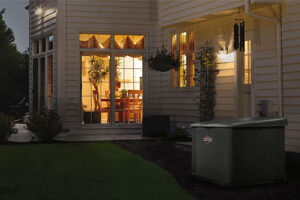9 Signs You Should Not Ignore
 With daytime temperatures soaring into the 80s in early May, you don’t need to wonder if it’s going to be a hot summer. But you may be wondering if your AC system is ready to handle another blazing-hot summer. Often, a professional tune-up and some minor repairs will ensure your system is ready for the season. One big question to ask yourself is how old is your AC. But there are other factors that can guide your decision between making repairs or going ahead with a replacement. Read on to learn more—and know that the pros at Bolkema are standing by to help with all your air conditioning needs.
With daytime temperatures soaring into the 80s in early May, you don’t need to wonder if it’s going to be a hot summer. But you may be wondering if your AC system is ready to handle another blazing-hot summer. Often, a professional tune-up and some minor repairs will ensure your system is ready for the season. One big question to ask yourself is how old is your AC. But there are other factors that can guide your decision between making repairs or going ahead with a replacement. Read on to learn more—and know that the pros at Bolkema are standing by to help with all your air conditioning needs.
Signs of Trouble
You won’t be able to miss some signs that your cooling system needs professional attention: Noise, including rattling, grinding and just louder operation means your equipment is working harder than it should. Other signals that your AC is having trouble can be more subtle. Here are 9 signs of pending problems you should never ignore:
- Increased humidity
- Excessive dripping
- Refrigerant leaking
- Thermostat problems
- Blowing hot air
- Poor airflow, uneven cooling
- Burning smells
- Moldy odors
- Too much dust
Repair or Replace?
A well-maintained system should provide at least 15 years of good service. The cost of a tune-up is usually worthwhile. It can prevent lots of small problems from turning into expensive repair jobs. But even with regular tune-ups, eventually age takes its toll. Repairs will get more frequent—and more expensive—once the warranty is expired.
If you do need a repair, we recommend the $5,000 rule: Multiply the age of your system by the cost of a repair. If it’s more than $5,000, you’re better off replacing your cooling equipment. So, for example, if you have a repair estimate of $1,200 for an 8-year-old system, you’d get $9,600—you’ll get better value from replacing your system.
The other thing to note with an older system is the type of refrigerant it uses. If your system that uses the phased-out R-22 refrigerant, you should definitely replace it. R-22 is hard to get—and very expensive.
Performance Factor
After age, the other important factor to consider is performance. Did your cooling system keep you comfortable last year, or did you experience frequent breakdowns? Did you see a big spike in your energy use—even though you had a tune-up? That can be a big red flag that your system isn’t operating as efficiently as it should be. (This is a great way to take advantage of any usage information your energy company provides: it can help you see when high bills are coming from increased rates or higher energy use. One thing you can control, the other you can’t.)
If you made changes to your home since your AC system was installed—such as converting an attic or basement into a usable space or enclosed a screen porch to make it a year-round space, those areas may not be cooled by your system. Our high-efficiency SuperPak systems are perfect for small-duct and no-duct installations and can address the problem without the need for an ugly window unit or a whole system replacement.
Time for an Update?
If the signs indicate it’s time to replace your cooling equipment, the good news is that a new system will run more efficiently and help you cut your cooling costs by as much as a third. We can help access your needs and talk to you about trouble spots, like those that never seem to cool off.
The best system in the world is only as good as the installation, and that’s why we never treat any job as routine. We know no two homes are alike, even if they look similar from the street. We’ll even show you why an ultra-high efficiency system might not be worth the extra cost for you, and we’ll help you navigate your options and find the best choice for your budget and your space.
If your system still has a few good years, it’s never too soon to schedule your AC system maintenance. Our technicians will perform a multi-point precision tune-up to ensure your equipment is running right. Annual maintenance is the key to getting the best performance out of your home’s cooling system.
Whatever your needs, the pros at Bolkema are here to make sure your cooling equipment is ready for the season. Contact us today.



 We may not see too many hurricanes in northern New Jersey and lower New York state, but we get our fair share of wind, rain, snow, and ice. And more extreme weather patterns lead to more frequent and extended power outages. Losing power for two or three hours is annoying, but an outage lasting much longer starts to be expensive, and even dangerous. It’s important to be prepared. One of the best ways to protect your home and property is with a backup or standby generator.
We may not see too many hurricanes in northern New Jersey and lower New York state, but we get our fair share of wind, rain, snow, and ice. And more extreme weather patterns lead to more frequent and extended power outages. Losing power for two or three hours is annoying, but an outage lasting much longer starts to be expensive, and even dangerous. It’s important to be prepared. One of the best ways to protect your home and property is with a backup or standby generator. There’s a lot of awareness when it comes to outdoor air quality; after all, reducing smog and greenhouse gases is important for helping slow climate change. Air quality also affects asthma rates, particularly in urban areas. But what can you do about the about the air quality in your home?
There’s a lot of awareness when it comes to outdoor air quality; after all, reducing smog and greenhouse gases is important for helping slow climate change. Air quality also affects asthma rates, particularly in urban areas. But what can you do about the about the air quality in your home?  When it comes to heating your home, natural gas is an increasingly common and popular option for a variety of reasons—it’s clean-burning, efficient and versatile. You can use it heat water and run a range of other equipment and appliances in and around your home. If you currently heat your home with electricity or heating oil, you might be considering different options. After all, how easy it is to make the switch to natural gas heating in the first place?
When it comes to heating your home, natural gas is an increasingly common and popular option for a variety of reasons—it’s clean-burning, efficient and versatile. You can use it heat water and run a range of other equipment and appliances in and around your home. If you currently heat your home with electricity or heating oil, you might be considering different options. After all, how easy it is to make the switch to natural gas heating in the first place? We’ve got five tips to help you keep warm and comfortable in your home this winter—and those winters to come—all while keeping heating costs better under control.
We’ve got five tips to help you keep warm and comfortable in your home this winter—and those winters to come—all while keeping heating costs better under control. There’s nothing worse than waking up in the middle of the night and thinking, “Gee, it’s cold in here!” …before you realize your heat isn’t working.
There’s nothing worse than waking up in the middle of the night and thinking, “Gee, it’s cold in here!” …before you realize your heat isn’t working. When your business depends on fuel to keep a fleet on the road, that fuel becomes more than just a line item in your budget. Sending drivers to gas stations for fill-ups is one option, but there are some advantages to fleet fueling that can make your business run better—and improve your bottom line.
When your business depends on fuel to keep a fleet on the road, that fuel becomes more than just a line item in your budget. Sending drivers to gas stations for fill-ups is one option, but there are some advantages to fleet fueling that can make your business run better—and improve your bottom line.  As the cold weather settles in and you’re using your heating system more and more, you may be noticing that it’s not working quite as well as it did even just a few seasons earlier. Maybe your rooms aren’t getting warm as quickly, or they don’t stay as warm throughout the evening hours. Maybe you’re using more fuel than you usually do, even though it hasn’t been very cold.
As the cold weather settles in and you’re using your heating system more and more, you may be noticing that it’s not working quite as well as it did even just a few seasons earlier. Maybe your rooms aren’t getting warm as quickly, or they don’t stay as warm throughout the evening hours. Maybe you’re using more fuel than you usually do, even though it hasn’t been very cold.  If you’re new to northern New Jersey, or you’re purchasing your first home, you may be looking for information about the best way to heat it. The good part is, you have a few options—propane, natural gas, electricity, but the best option for the damp cold winters here in northern New Jersey and lower New York State is oil heat. Those other fuels just don’t provide the same heating energy!
If you’re new to northern New Jersey, or you’re purchasing your first home, you may be looking for information about the best way to heat it. The good part is, you have a few options—propane, natural gas, electricity, but the best option for the damp cold winters here in northern New Jersey and lower New York State is oil heat. Those other fuels just don’t provide the same heating energy!